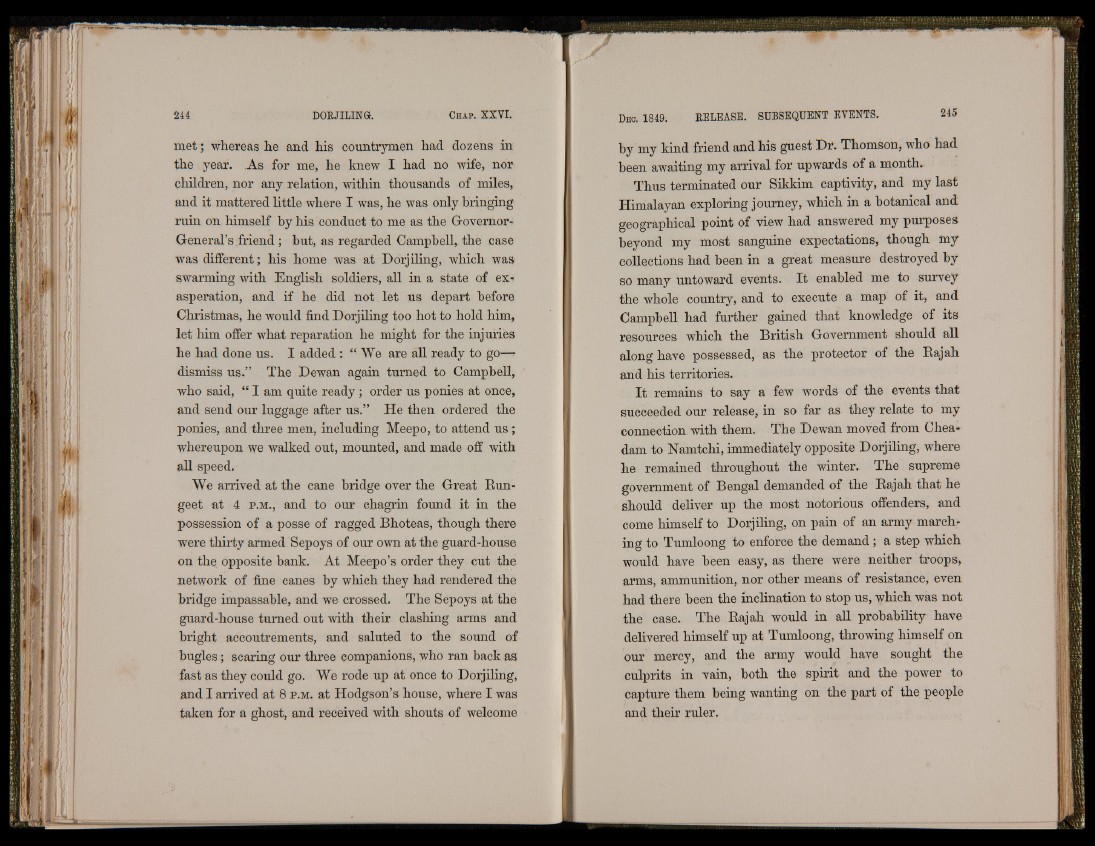
m e t; whereas he and his countrymen had dozens in
the year. .As for me, he knew I had no wife, nor
children, nor any relation, within thousands of miles,
and it mattered little where I was, he was only bringing
ruin on himself by his conduct to me as the Governor-
General’s friend; but, as regarded Campbell, the case
was different; his home was at Dorjiling, which was-
swarming with English soldiers, all in a state of ex-
asperation, and if he did not let us depart before
Christmas, he would find Dorjiling too hot to hold him,
let him offer what reparation he might for the injuries
he had done us. I added : “ We are all ready to go—
dismiss us.” The Dewan again turned to Campbell,
who said, “ I am quite ready; order us ponies at once,
and send our luggage after us.” He then ordered the
ponies, and three men, including Meepo, to attend us ;
whereupon we walked out, mounted, and made off with
all speed.
We arrived at the cane bridge over the Great Run-
geet at 4 p .m ., and to our chagrin found it in the
possession of a posse of ragged Bhoteas, though there
were thirty armed Sepoys of our own at the guard-house
on the opposite bank. At Meepo’s order they cut the
network of fine canes by which they had rendered the
bridge impassable, and we crossed. The Sepoys at the
guard-house turned out with their clashing arms and
bright accoutrements, and saluted to the sound of
bugles; scaring our three companions, who ran back as
fast as they could go. We rode up at once to Dorjiling,
and I arrived at 8 p .m . at Hodgson’s house, where I was
taken for a ghost, and received with shouts of welcome
by my kind friend and his guest Dr. Thomson, who had
been awaiting my arrival for upwards of a month.
Thus terminated our Sikkim captivity, and my last
Himalayan exploring journey, which in a botanical and
geographical point of view had answered my purposes
beyond my most sanguine expectations, though my
collections had been in a great measure destroyed by
so many untoward events. I t enabled me to survey
the whole country, and to execute a map of it, and
Campbell had further gained that knowledge of its
resources which the British Government should all
along have possessed, as the protector of the Rajah
and his territories.
I t remains to say a few words of the events that
succeeded our release, in so far as they relate to my
connection with them. The Dewan moved from Chea-
dfl.m to Namtchi, immediately opposite Dorjiling, where
he remained throughout the winter. The supreme
government of Bengal demanded of the Rajah that he
should deliver up the most notorious offenders, and
come himself to Dorjiling, on pain of an army marching
to Tumloong to enforce the demand; a step which
would have been easy, as there were neither troops,
arms, ammunition, nor other means of resistance, even
had there been the inclination to stop us, which was not
the case. The Rajah would in all probability have
delivered himself up at Tumloong, throwing himself on
our mercy, and the army would have sought the
culprits in vain, both the spirit and the power to
capture them being wanting on the part of the people
and their ruler.